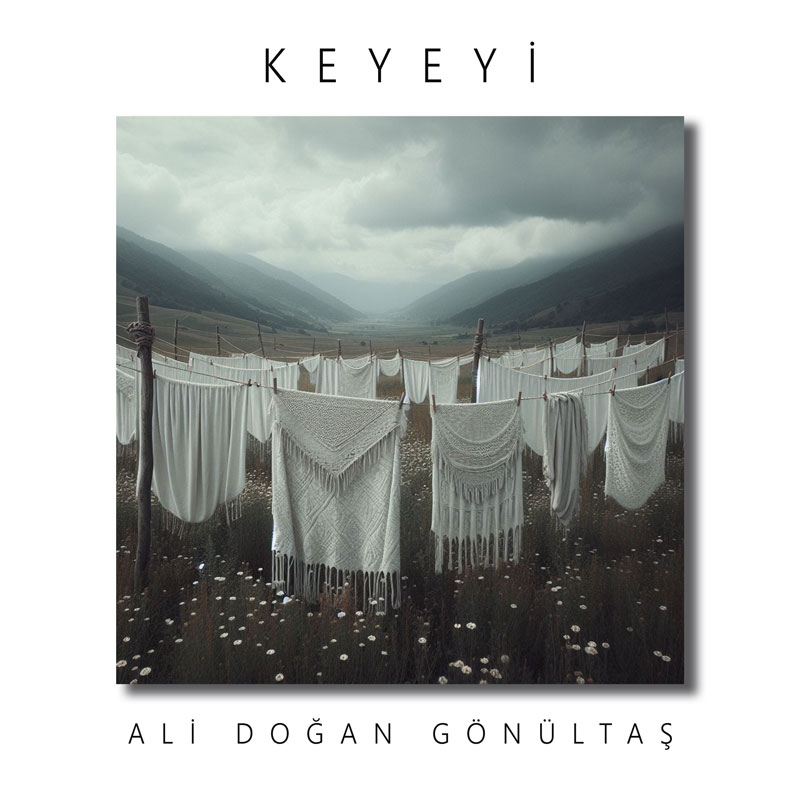Ali Doğan Gönültaş – Keyeyî (Mapamundi Música, 2024)
Ali Doğan Gönültaş, an emerging figure in Kurdish music, has unveiled his splendid second solo album, Keyeyî. Born in Kiğı, Eastern Anatolia, to a family deeply rooted in Alevi tradition, Gönültaş inherits a musical heritage integral to the storytelling of his people, often shared around the tables of mothers.
The album title, Keyeyî, translates to “homes” in Zazakî, Gönültaş’s mother tongue. Recorded concurrently in both audio and video formats, the exquisite album features Gönültaş’s conjuring voice, accompanied solely by the deeply mesmerizing tembur.
Divided into two parts, the first segment, “Şemuge” (meaning “threshold” in Zazakî), incorporates songs in Zazakî and Kirdaskî, marking the initial steps toward the notion of home. Indeed, Gönültaş emphasizes the significance of beginning this journey in his native language, affirming, “My mother tongue is my home!”
The second section, “Annelerin Sofraları” (Mothers’ Tables), exclusively presents Turkish nefes and methiye, traditional Alevi song forms. Here, Gönültaş pays homage to the memories of his mother and her close companions, reflecting on the intimate gatherings around their tables. With this in mind, he dedicates the album to these maternal figures, acknowledging their role in fostering a sense of belonging and emotional fulfillment.
In words of the artist, “The album emerged from the sounds of the places I was born into and became aware of. I needed to return home to remember and remind. Home is not only an address for me, but also a state of feeling and meaning. It is more than just a space with walls, rooms and windows, it is a state of joy, mourning, expression in different languages.
“In this work, which was recorded simultaneously with video and audio, only the tembur and my voice are present.
“The first part of the two-part album is called Şemuge, which means threshold in Zazakî. This part, consisting of songs in Zazakî and Kirdaskî, consists of the first steps towards the home. I found it meaningful that the first steps are in my mother tongue. My mother tongue is my home!
T“he second section is called Annelerin Sofraları (Mothers’s Tables). In this section, which consists entirely of Turkish nefes and methiye (Alevi songs forms), I remind myself of the tables set by my mother and her closest friends.
“Different tables set in different homes, but similar feelings… I dedicate this album to my mothers who set these tables with real conversation and music. Each time I left those tables both physically and emotionally satiated. Every table they set made me feel at home.
“I hope these sounds can remind the listener of the calmness of arriving home..”
The songs presented in Keyeyî evoke diverse narratives and emotions, performed in Kirdaskî, Zazakî, and Turkish, reflecting on historical events and personal experiences. “Şemuge” begins with “Hespî Degdî,” commemorating the Armenian massacre, with haunting vocals echoing exile and resistance.
“Abaso” recounts a tragic fate in Korea, while “Dotmamê” expresses love amidst familial ties. Moving forward, “Warway” laments the erosion of Zazaki culture. Concurrently, “Nedendir” delves into longing for the divine, while “Bin Derdim Var idi” explores Alevi philosophy on suffering.
“Ak Meleğim” contemplates life and death, while “Bugün Pazar-ı Aşktır” symbolizes divine love through human allegory, encapsulating Alevi spirituality.
Each emotive song expertly unveils layers of history, culture, and personal introspection, forming a rich and enthralling set of musical storytelling.


